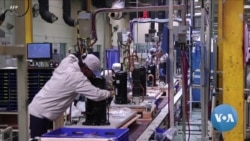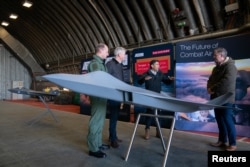Japan is struggling to boost its domestic defense industry in spite of the country’s ambitious plans to respond to China’s growing militarization in the East China Sea.
The government is investing $315 billion in its defense program over the next four years, but some of Japan’s technological and industrial giants are reluctant to produce more weapons alongside their well-known consumer products.
Japanese technology
Japan’s most famous global brands are more familiar as the makers of televisions, washing machines or cars. Less well known – even in Japan – is that they also make military equipment.
Mitsubishi makes fighter jets and missiles for Japan’s self-defense force. Electronics firm Toshiba makes military-grade batteries. Car maker Subaru produces military helicopters. Daikin, better known for its air conditioning units, has a side business producing munitions.
Now, the government wants Japan’s industrial giants to ramp up production of military equipment – but it has been met with a muted response, according to a recent report by the Reuters news agency.
Export ban
A ban on arms exports was only lifted in 2014, so very few Japanese defense companies sell overseas, explains analyst Tetsuo Kotani of the Japan Institute for International Affairs.
“For Japanese defense companies, the (Japanese) self-defense forces are the only buyer. So, it's not so easy for those companies to make profits by making weapons. And because of that, several particularly smaller companies are now going away from those defense industries,” Kotani told VOA.
More than 100 Japanese companies have left the defense sector over the past 20 years, according to the Japanese financial analyst firm Nikkei.
“Heavy reliance on foreign companies is not so good in terms of the supply chain resiliency, so the Japanese government decided to give a subsidy to those Japanese defense companies who are suffering. And by doing so we are trying to maintain our indigenous defense build-up capabilities,” Kotani said.
Western allies
Japan, Italy and Britain earlier this year announced the joint development of a new fighter jet program, named Tempest. Mitsubishi is involved in the project.
Meanwhile, Tokyo recently issued guidelines to harmonize equipment with U.S. and European standards. The U.S. alliance is the cornerstone of Japanese defense – and it’s vital that Japan buys the right equipment, says Grant Newsham, a retired U.S. Marine colonel and diplomat and former liaison to the Japan Self-Defense Forces.
“What hardware do you need? What resources do you need? What capabilities do you need to defend your country? What do you need to fit in with the Americans to make this a real joint effort? I don't know that that thinking has been done.”
It’s not all about spending money, Newsham added.
“Japan doesn't have a joint operational headquarters yet, which means the air, sea and ground forces don't really cooperate with each other. They're talking about having one in 2025 - not exactly a sense of urgency.”
“There is no joint headquarters between the Americans and the Japanese, and that's after 60-plus years of a defense alliance. That is baffling and it needs to be addressed quickly,” Newsham told VOA.
Public opposition
For decades most Japanese have opposed increased military spending. A survey conducted in March shows slightly more than 40 percent of voters want to expand the self-defense forces, up from 29 percent five years ago.
Reuters reported that Japan’s industrial giants are likely wary of tarnishing their brand among consumers by expanding into military production.
The head of Mitsubishi Electric's defense systems division, Masahiko Arai, told Reuters that he hoped that contributing to Japan's "safety and security” would be beneficial for the firm, but his biggest concern was what would happen after Japan's five-year military buildup ends. Other defense companies did not respond to requests for comment.






